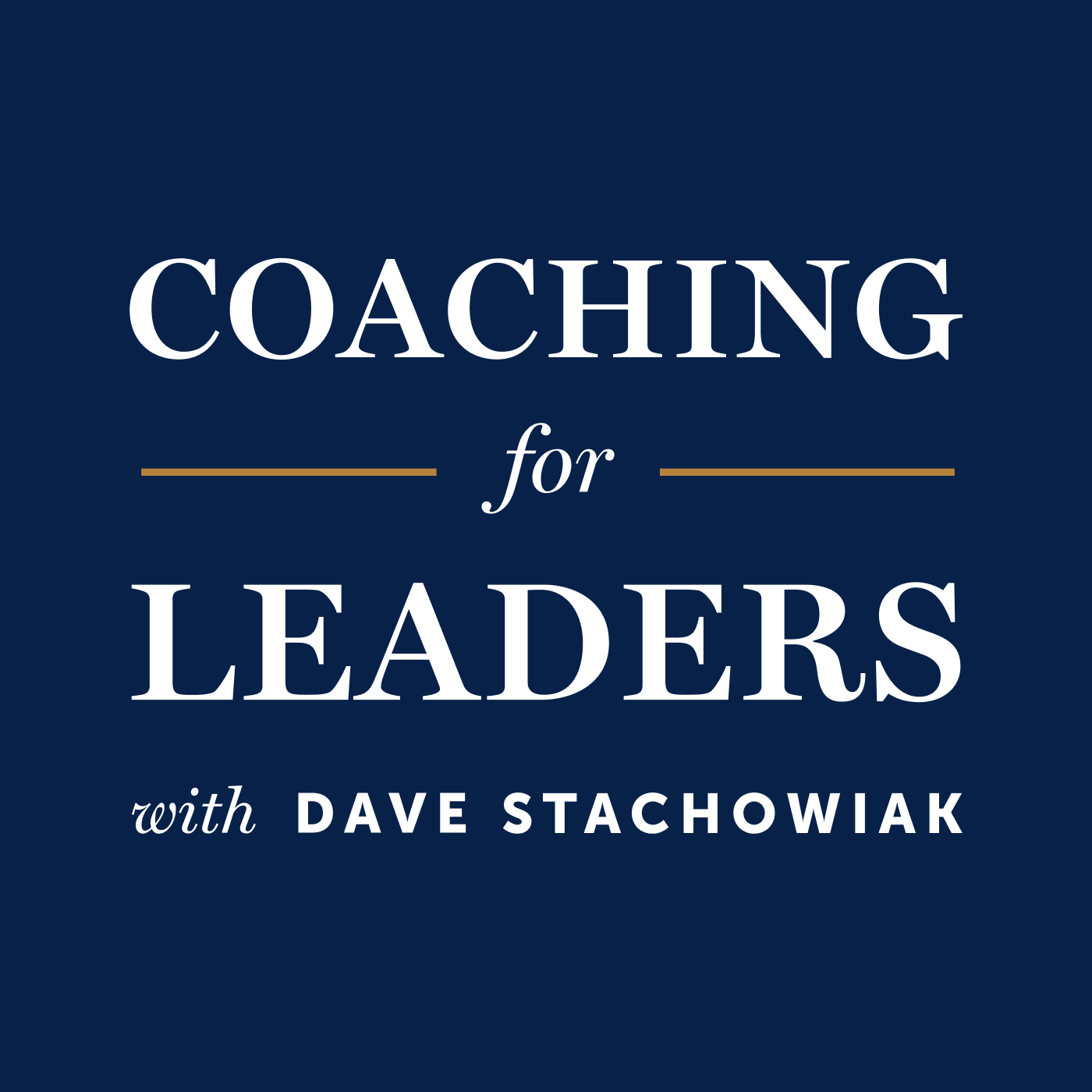

Coaching for Leaders
Dave Stachowiak
Leaders aren’t born; they’re made. Many leaders reach points in their careers where what worked yesterday doesn’t work today. This Monday show helps leaders thrive at these key inflection points. Independently produced weekly since 2011, Dr. Dave Stachowiak shares insights from a decade of leading a global leadership academy, plus more than 15 years of leadership at Dale Carnegie. Bestselling authors, proven leaders, expert thinkers, and deep conversation have attracted 50 million downloads and over 300,000 followers. Join the FREE membership to search the entire leadership and management library by topic at CoachingforLeaders.com
Episodes
Mentioned books

Sep 7, 2020 • 31min
490: Leadership Through Consistency, with Joseph Getuno
Joseph Getuno, a finance director from Mauritius and a devoted listener of the show, shares his insights on leadership and personal growth. He discusses strategies for capturing ideas from podcasts and emphasizes the necessity of action to bring insights to life. The conversation also highlights the transformative power of establishing team guidelines and fostering open communication. Getuno stresses that while consistency may seem ordinary, it's crucial for effective leadership and driving meaningful progress within teams.

Sep 7, 2020 • 39min
489: Responding to an Acquisition, with Bonni Stachowiak
The podcast dives into the challenges employees face during mergers and acquisitions, stressing the need for transparent communication and cultural understanding. It offers practical advice on tracking professional development goals through effective note-taking, moving beyond memory reliance. Additionally, it discusses the dual roles of educators and leaders, highlighting strategies for accountability and collaboration. Listeners get insights into leadership styles and the significance of fostering a positive organizational culture.

Aug 31, 2020 • 34min
488: Leadership Means You Go First, with Keith Ferrazzi
Keith Ferrazzi, the founder and CEO of Ferrazzi Greenlight and a renowned author, discusses his groundbreaking insights on leadership. He emphasizes the concept of co-elevation, advocating for proactive engagement and personal accountability among leaders. Ferrazzi outlines six deadly sins leaders should avoid, including laziness and cowardice, and shares personal stories that highlight the importance of relationships in achieving success. He challenges traditional hierarchies, promoting a collaborative approach to foster teamwork and innovation.

Aug 24, 2020 • 32min
487: Saying Yes to Big Challenges, with Elizabeth Cousens
In this engaging conversation, Elizabeth Cousens, President and CEO of the United Nations Foundation, shares her insights from the frontlines of global diplomacy and peacebuilding. She reveals how her team raised over $200 million during the COVID-19 pandemic, emphasizing the balance of crisis and opportunity in global health. Elizabeth discusses the importance of leading with kindness and harnessing the energy of 'impatient optimists' to drive change. She also reflects on the critical intersections of personal well-being and professional responsibilities in tackling global challenges.

Aug 17, 2020 • 39min
486: Three Stories to Tell During Uncertainty, with David Hutchens
David Hutchens, a global storytelling expert and author, dives into the art of narrative as a leadership tool. He shares how leaders can craft continuity stories that reflect core values, novelty stories to inspire innovation, and transition stories that celebrate progress during uncertain times. With examples and frameworks, David shows how effective storytelling can foster engagement, inspire change, and create emotional connections, guiding organizations through challenges while maintaining their identity and vision.

12 snips
Aug 15, 2020 • 33min
485: What Effective Delegation Looks Like, with Michael Byrne
Michael Byrne, an attorney and partner at Silverman Shin & Byrne, shares valuable insights on effective delegation. He compares trying to handle everything alone in leadership to mowing a lawn with scissors. With a focus on fostering the right conversation dynamics, he emphasizes the importance of allowing others to speak and discovering their own solutions. Delegating not only frees up time for skill development but also enhances leadership presence and deep work. Michael's experiences showcase how delegation can transform responsibilities into tools for empowerment and team growth.

Aug 10, 2020 • 39min
484: Where to Start on Subscriptions, with Robbie Kellman Baxter
Robbie Kellman Baxter, an expert in membership and subscription models, shares her extensive experience in helping organizations adapt to these shifts. She discusses the growing trend towards subscriptions in various industries, emphasizing the importance of creating a 'forever promise' to customers. Robbie highlights the need for businesses to truly understand their best customers and avoid simply repackaging existing services. She also provides insights into innovative approaches that enhance subscriber value, focusing on long-term relationships over immediate sales.

Aug 3, 2020 • 30min
483: How to Start in Leadership, with Bonni Stachowiak
Discover tips for new supervisors navigating the challenges of leadership. Gain insights on leading individuals older than yourself and hear inspiring stories from influential leaders like Katharine Graham. Learn how to balance personal well-being with professional responsibilities while fostering collaboration. Explore strategies for effective communication and decision-making in diverse teams, and uncover valuable resources to support your leadership journey.

62 snips
Jul 27, 2020 • 33min
482: How to Sell Your Vision, with Michael Hyatt
Michael Hyatt, CEO of Michael Hyatt & Company and author of bestselling books, shares his insights on leadership and vision communication. He emphasizes starting with direct reports who resist change and the importance of active listening. Hyatt highlights the necessity of aligning your vision with your boss's goals and presents strategies for gaining team buy-in. He also discusses the delicate balance between critical thinking and innovation, along with effective presentation techniques to communicate your vision clearly and consistently.

Jul 20, 2020 • 39min
481: How Great Teams Find Purpose, with David Burkus
David Burkus, an award-winning author known for his insights on innovation and leadership, shares powerful strategies for team motivation. He emphasizes the importance of picking a meaningful 'fight' rather than competing with rivals. Burkus outlines three useful fights for leaders: the Revolutionary Fight, the Underdog Fight, and the Ally Fight, each serving to unite and inspire teams around a shared purpose. He also discusses how superordinate goals can enhance collaboration and creativity within organizations.


